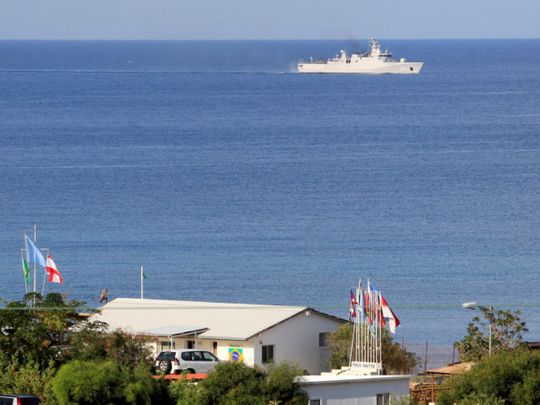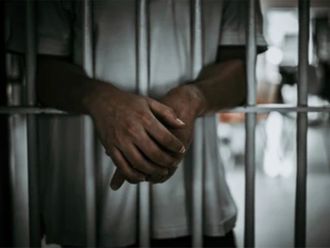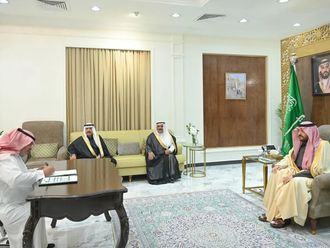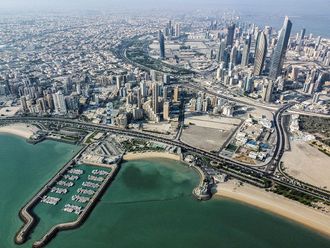
Damascus: One month after Lebanon got its new cabinet, Israel announced its readiness to return to the negotiating table over potentially gas-rich disputed waters in the eastern Mediterranean.
When and if concluded, those negotiations can carry economic relief for the Lebanese state, currently suffering from one of the worse financial crisis in modern world history. Producing and exporting gas would bring plenty of money into the empty coffers of the Lebanese state, which once relied heavily on revenue from tourism and banking, two sectors that have now collapsed.
The maritime talks began under UN auspices last autumn, but they were suspended five months ago due to impossible conditions set forth by Lebanon’s former Prime Minister Hassan Diab, a protégé of Hezbollah and close ally of President Michel Aoun. US special envoy Amos Hochstein is expected in both Beirut and Tel Aviv by the end of this month to jump-start the negotiations, although Israel has made it clear that it will not abide by dictates set forth by Lebanon. Impossible conditions
Five months ago, the talks stalled over two major issues. One was Israel’s granting the American firm Halliburton a drilling contract in the disputed area, which Lebanon claims is illegal so long as the disputed water area has not been formally delineated.
Surprising amendment
Second, and more important, was Lebanon’s surprising amendment of the disputed area, pushing the line from 860 square kilometres to 2,290 square kilometres. Israel flatly rejected the additional 1,430 square kilometres, claiming that it had no legal basis. “Pushing the lines … it’s not the way to have a negotiation,” said Israeli Energy Minister Karine Elharrar, adding: “They cannot dictate the lines.”
Prime Minister Najib Mikati may renew the negotiations, said Yeghia Tashjian, an Associate Fellow at the Issam Fares Institute for Public Policy and International Affairs at the American University of Beirut (AUB). Speaking to Gulf News, he cited a new, positive atmosphere in the region, mirrored by Iranian-Saudi negotiations over Yemen, international nuclear talks with Iran, and the Arab Gas Pipeline that will bring Egyptian gas to Lebanon, hoping that this would prevent it from falling into Iran’s arms.
“My only concern is that Lebanon’s fragmented political landscape may torpedo the process of negotiations, and eventually, Israel would continue exploring and later extracting oil and gas from the disputed area.” What brought down the talks last May can still apply to any future negotiations, he added, saying: “Its questionable whether the new government would fully vote for amending the disputed territory and what the president’s position will be?
Aoun’s gambit
The newly claimed territory was the originally brainchild of President Aoun, however, who first raised the matter with the specific purpose of creating a political hurdle that only he could solve. He referred the matter to the cabinet of ministers, asking Prime Minister Diab and the Ministers of Defence and Public Works to ratify it into a decree that would be sent to the United Nations as the basis for any future negotiations.
Defence Minister Zeina Akar called on Parliament Speaker Nabih Berri to complain, given that he had been handling the border dispute for an entire decade, on the basis of 860 square kilometres, not 2,290. Such an amendment would not only infuriate American mediators, he claimed, but it would also run the high risk of debunking the talks altogether, given that Israel would never accept the newly claimed territory.
The 860 sq km has been a long-standing demand of Lebanese officialdom, after all, documented in writing through all correspondences and maps sent to the United Nations. Changing it in such an abrupt manner would look both unprofessional and very amateurish, said those close to Berri.
When Public Works Minister Michel Najjar asked for a grace period to study the proposed amendments, he was criticised by Hezbollah-backed media, which described the newly claimed waters as a “natural right” for Lebanon. Diab and his two ministers eventually signed off Decree 6433, sending it back to the Presidential Palace for final approval, as required by the Lebanese Constitution.
Aoun then surprised them all by refusing to sign, claiming that the decree required approval of all ministers, and not just the Ministers of Defence and Public Works. When receiving US Undersecretary of State for Political Affairs David Hale in Beirut last April, he promised to address the problem, saying that his country would return to the negotiating table “with no preconditions”.
Many believe that the entire ordeal was a PR stunt by the president who wanted to give himself a direct role in the negotiations, coming across as a problem-solver with the United States. He pushed the line to achieve multiple objectives, one of which was pleasing his Hezbollah allies, who were never too happy about the negotiations.
Secondly, it was to make himself useful to the Americans, who had been keeping the Lebanese president at arms-length, due to his affiliation with Hezbollah. Last November, his son-in-law and political heir, Gibran Bassil, was sanctioned by the Trump Administration due to ties with Hezbollah, putting a damper on Aoun’s ambition of making him president when his own term ends in October 2022. Refusing to sign off the decree made him stand out as moderate and pragmatic, scoring points with the Trump White House.
Hezbollah-Aoun dispute
Standing at a distance from all that is happening on the border dispute is Hezbollah, which built its entire legacy on rejecting any face-to-face talks with Israel that would imply de facto recognition. When signing off the talks last October, they conditioned that the negotiating team is composed of technicians and military officers only, making sure that no civilians are included so as not to give the talks a political face.
That brought them into confrontation with Basil, who has been trying to expand the Lebanese delegation to include officials from the Ministry of Foreign Affairs, and staffers from the Presidential Office. Both requests have been firmly rejected by Hezbollah, and so was Basil’s suggestion that former foreign ministers are invited to the talks (which would make him eligible to attend).
He also infuriated Hezbollah by suggesting that Lebanon might be open to sharing waters with Israel. Basil’s bargaining led to a stiffer position from Hezbollah, which now refuses to bless the talks but nevertheless says that it will not work at obstructing them. That explains why they signed off Aoun’s additional territory, hoping that this would suffice at drowning the talks, without them having to intervene directly to bring them down.








